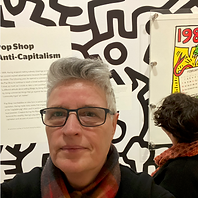
We believe justice is a future goal and a present imperative. Our work begins with the realities people face today and looks ahead to build systems, technologies, and policies that are equitable, accountable, and trustworthy.

We approach design as a generative, imaginative practice that enables communities—not just technologies—to thrive. Creativity is central to how we envision alternatives, build solidarity, and engage with uncertainty.

We examine and challenge dominant sociotechnical paradigms through critical design practices. Drawing on adversarial design, speculative prototyping, and systems critique, we surface hidden assumptions, imagine alternatives, and test the boundaries of what design can do.

We approach design as relational and embedded—always part of larger sociotechnical systems. Our work draws on systems thinking and participatory approaches to understand interdependencies and co-create interventions that are contextually grounded and ethically oriented.

In the face of present social and technological challenges (something about democracy). We work in conversation—with disciplines, with communities, with collaborators near and far. Our research lives in dialogue, not silos. We build knowledge through exchange, valuing the expertise that comes from lived experience as much as from theory or practice.

Dr. Beth Coleman is Associate Professor of Data & Cities at the Institute of Communication, Culture, Information and Technology and Faculty of Information, University of Toronto. Working in the disciplines of science and technology studies and generative aesthetics Beth Coleman’s research focuses on artificial intelligence & smart technology, urban data and civic engagement, and transmedia arts. She is the author of Hello Avatar and Reality Was Whatever Happened: Octavia Butler AI and Other Possible Worlds, as well as many articles, including “Race as Technology” and “Technology of the Surround.” She has been a Google Brain and Responsible AI senior visiting researcher with as well as a 2021 Google Artists and Machines Intelligence awardee. She is a founding member of the Trusted Data Sharing group and research lead on AI policy and praxis at the Schwartz Reisman Institute for Technology & Society. Her research affiliations have included the Berkman Klein Center for Internet & Society, Harvard University; Microsoft Research New England; Data & Society Institute, New York; and expert consultant for the European Commission Digital Futures. She served as the Founding Director of the U of T Black Research Network Institute Strategic Initiative. She is the co-founder of SoundLab Cultural Alchemy, an internationally acclaimed multimedia art and sound platform. She has a history of international exhibition and artist residencies including venues such as the Whitney Museum of American Art, New Museum of Contemporary Art, Récollets Paris, and Pioneer Works, New York. She is currently working on the monograph, AI in the World: perils and possibilities of a General Purpose Technology.

Associate Director of Research
Matt Ratto is Professor and Associate Dean, Research in the Faculty of Information at the University of Toronto. He studies and practices ‘critical making’, work that combines humanities insights and engineering practices and has published extensively on this concept.
He publishes across a wide range of disciplines including recent work on hope and interventional digital projects (CSCW 2023), generative AI and mental health (JMIR 2023), and additive manufacturing and prosthetics(CJPO 2020; JPO 2020). Matt is always ready to speak with students and others interested in the intersection of the humanities, Human-Computer Interaction, and emerging health care technologies.

Dean of the Faculty of Information
Professor Mostafa completed his PhD in information science at the University of Texas at Austin in 1994, with a focus on developing query models for video information. Professor Mostafa came to U of T from the University of North Carolina at Chapel Hill where he served as a Professor and the founding Director of an interdisciplinary informatics training program called the Carolina Health Informatics Program. At UNC, Professor Mostafa held the McColl Term Professorship position during multiple intervals. Previously, at Indiana University, Bloomington, Professor Mostafa held the Victor H. Yngve Endowed Professorship and he also served as an Associate Dean of Academics and an Associate Dean of Research. At U of T he directs the Laboratory of Applied Informatics Research (LAIR). Javed is currently a Professor and the Dean of the Faculty of Information. He is also the co-founder of two U.S.-based companies: KeonaHealth and Cymantix.
KMDI is currently involved in teaching through the Knowledge Media Design Collaborative Specialization (KMD CS). The KMD CS addresses the ways media and media technologies shape, and are shaped by, human activity. We design, build, use, evaluate, and critique the media and policies of our networked world.




We work in conversation—with disciplines, with communities, with collaborators near and far. Our research lives in dialogue, not silos. We build knowledge through exchange, valuing the expertise that comes from lived experience as much as from theory or practice.



We work in conversation—with disciplines, with communities, with collaborators near and far. Our research lives in dialogue, not silos. We build knowledge through exchange, valuing the expertise that comes from lived experience as much as from theory or practice.

STREET Lab

Labour Process & Technology Lab

Social Agentics Lab

Administrative
Coordinator

Research Manager &
Media Lead

Makerspace Technician & Lab Coordinator

Research Associate; Lead,
Communications and Engagement
The Knowledge Media Design Institute (KMDI) is an interdisciplinary research institute, at Faculty of Information, University of Toronto. KMDI Director, Beth Coleman, along with a distinguished Executive Committee, work with faculty, students, and alumni from over twenty-five departments and eleven faculties across the Tri-Campus. The KMDI community extends to researchers, non-profits, policymakers and businesses in both the public and private sectors. Our team supports the research community by identifying potential collaborations, supporting new projects, and working to access new funding opportunities.
KMDI was founded in 1996 by Professor Ron Baecker, and was UofT’s first virtual institute. Our researchers and students explore, design, and critique the knowledge media that enable people to communicate, create, learn, share, and collaborate. In 2018, KMDI merged with the Semaphore Research Cluster, which was co-founded in 2011 by Professors Matt Ratto, Sara Grimes, and Rhonda McEwen, as part of the Inclusive Design Institute (IDI). Semaphore generated action research into the technosocial dimensions of mobile, pervasive, digital and virtual technologies aimed at supporting marginalized groups and individuals.
The goal of the merger of KMDI and Semaphore was to expand our research agenda, and advance our shared values for social justice and human-centred design through action research. This is represented in the work being carried out in our different research labs including STREET Lab, Social Agentics Lab, Labour Process & Technology Lab, and the Makerspace. Much of this work is driven by critical inquiries of technologies that bridge the material and digital, such as 3D printing and gaming technologies. This is done through hands-on engagement, deconstructing and modifying the researched technologies, complementing the theoretical and abstract approach of information research that is found at the Faculty of Information.
KMDI is concerned with the ever-evolving interaction between humans and technology. We live in a designed world where the role of humans is constantly changing and will continue to change. The mission of KMDI is to carry out research and education that will inform the design of devices, systems, and applications to enhance and ameliorate the role of humans in a world of embedded, supporting, and sometimes controlling technologies. We approach this role from a multidisciplinary, collaborative, and human-centred perspective, combining science, technology, arts and design in its response to technological opportunity and change. In a rapidly evolving world, KMDI is a continuous evolving organization that seeks to address the problems of today as well as the challenges and opportunities of tomorrow. The increasing use of sensors, availability of data, prevalence of mobile devices and augmented intelligence, and rapid advances in brain science and software tools of all kinds provide KMDI with a rich palette to work with. Although it works at the frontiers of design and technology, the overarching goal of KMDI is to support and enhance the role of humanity in a world of mixed human and technological intelligence.
KMDI is situated in an open-concept cluster of offices, workspaces and dedicated research spaces, on the 7th floor of the Robarts Library.